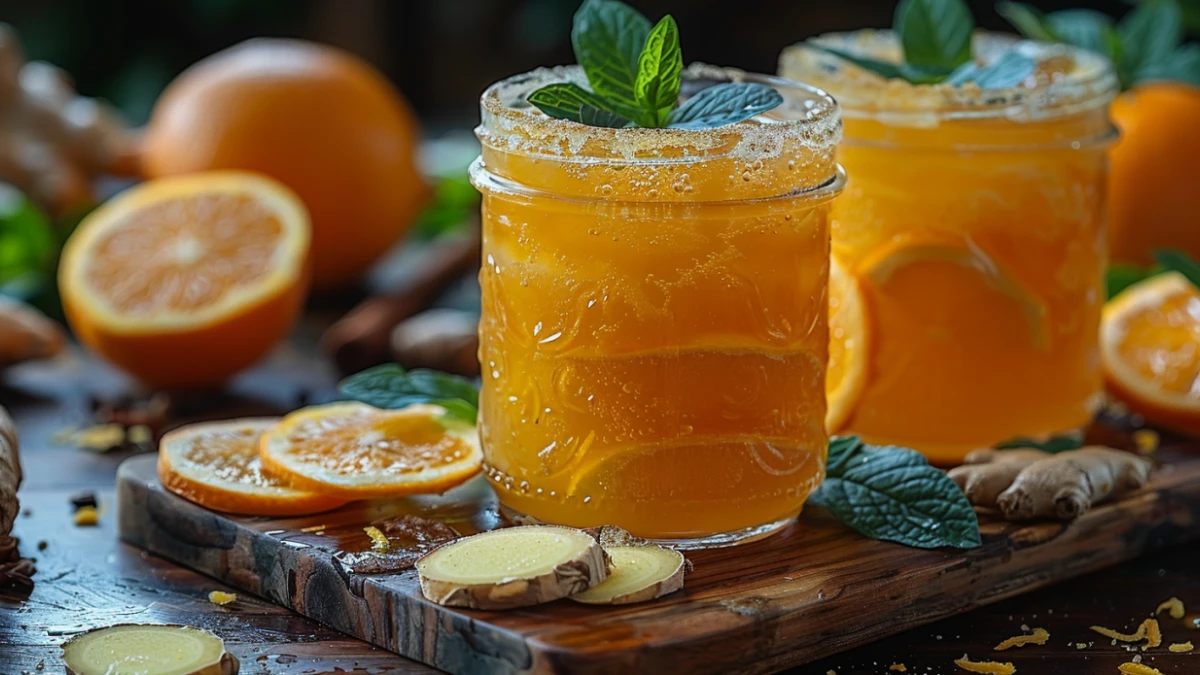Kombucha tea has surged in popularity, appearing on grocery store shelves and in trendy cafes worldwide. This fermented beverage, crafted from tea, sugar, and a symbiotic culture of bacteria and yeast (SCOBY), is celebrated for its potential health benefits and distinctive fizzy profile.
From its caffeine content to its suitability for kids, daily consumption, and the popular KeVita brand, we’re exploring it all. We’ll also cover its taste, effects, and the best time to enjoy this probiotic-rich drink. Let’s dive into the world of kombucha!
Is Kombucha Really Worth the Hype?
If you’ve ever walked past the health drink aisle, you’ve probably seen rows of colorful kombucha bottles staring back at you. Some people swear by it for digestion, others love it as a soda alternative, and a few just enjoy the funky, fizzy taste. But what exactly is kombucha, and why is everyone drinking it?
Simply put, kombucha is a fermented tea packed with probiotics, antioxidants, and organic acids that can do wonders for your body. This ancient beverage has been consumed for centuries, and modern science is finally catching up to its potential health benefits. Let’s dive into why kombucha might just be the health drink you didn’t know you needed!
1. Supports Gut Health & Digestion
- Kombucha is loaded with probiotics, the beneficial bacteria that help maintain a healthy gut microbiome. A balanced gut can:
- Improve digestion
- Reduce bloating
- Enhance nutrient absorption
- Support a healthy metabolism
If you struggle with digestive issues, adding kombucha to your routine might be a game-changer.
2. Boosts Immunity
A strong gut means a strong immune system! Since 70% of your immune system is in your gut, the probiotics and antioxidants in kombucha can help:
- Strengthen your body’s defenses
- Reduce inflammation
- Fight off harmful bacteria and infections
Drinking kombucha regularly might just help you avoid those seasonal colds.
3. Helps Detoxify the Body
Kombucha contains glucuronic acid, a natural detoxifier that helps flush out toxins from the liver. Plus, its antioxidants work to combat free radicals, which can damage cells over time.
Think of kombucha as a little detox boost for your body!
4. May Aid in Weight Management
If you’re trying to cut back on sugary drinks, kombucha is a great alternative. It’s:
- Lower in sugar than soda and fruit juices
- Naturally fermented, which can support metabolism
- Lightly carbonated, making it a satisfying replacement for high-calorie drinks
Some studies suggest that acetic acid, found in kombucha, may help regulate blood sugar levels and curb cravings.
5. Supports Mental Health & Energy Levels
Feeling sluggish? Kombucha has a small amount of caffeine and B vitamins, which can provide a natural energy boost. Plus, research shows that a healthy gut is linked to improved mood, focus, and reduced anxiety.
How Much Caffeine Does Kombucha Have?
Kombucha begins with tea—typically black or green—so it naturally contains caffeine. On average, an 8-ounce serving of store-bought kombucha delivers about 10-15 milligrams of caffeine, though this varies by brand and brewing method. For context, a cup of coffee contains around 95 milligrams, making kombucha a gentler energy boost.
Some brands, like KeVita Master Brew Kombucha, enhance their caffeine content with green coffee bean extract, reaching up to 68 milligrams per 15.2-ounce bottle—still less than coffee but enough for a noticeable lift.
The caffeine level hinges on the tea type and fermentation duration, as the SCOBY consumes some of it during the process. If you’re sensitive to caffeine, check labels or choose a low-caffeine option.
Can Kids Have Kombucha?

Parents often ask if kombucha’s benefits extend to children. The answer isn’t straightforward. Kombucha contains small amounts of caffeine (10-15 milligrams per serving), trace amounts of alcohol (typically under 0.5%), and live bacteria, which can pose concerns for kids. The American Academy of Pediatrics recommends no caffeine for children under 12, making kombucha risky for younger ones. The minimal alcohol content, while safe for adults, might also affect developing systems.
Additionally, the live bacteria—beneficial for gut health—could overwhelm sensitive stomachs or immune systems, particularly in immunocompromised kids. For teens over 12, a modest amount (up to 12 ounces daily) may be okay, but moderation is crucial. Safer probiotic alternatives like yogurt or kefir are often recommended for younger children.
Can I Drink Kombucha Every Day?
For most healthy adults, drinking kombucha daily is perfectly fine and can support gut health. Its probiotics may improve digestion, while antioxidants from the tea could combat inflammation. The Centers for Disease Control and Prevention (CDC) suggests starting with 4 ounces daily, though many tolerate up to 16 ounces without problems.
Overconsumption, however, might cause bloating, excess sugar intake, or mild caffeine effects. Kombucha’s acidity could also wear on tooth enamel over time, so using a straw and rinsing with water afterward is wise.
Pregnant or breastfeeding individuals or those with weakened immune systems should consult a doctor due to the unpasteurized nature of some kombucha. For others, daily enjoyment can be a refreshing habit when balanced with a varied diet.
Is KeVita Kombucha Good for You?
KeVita, a PepsiCo-owned kombucha brand, is popular for its bold flavors and accessibility. KeVita Master Brew Kombucha offers live probiotics, organic acids, and a boosted 68 milligrams of caffeine per bottle, positioning it as a natural energy drink with gut health benefits.
However, KeVita pasteurizes its kombucha post-fermentation for consistency and shelf life, then adds probiotics back in. This process eliminates naturally occurring bacteria, which some traditionalists argue reduces its “raw” value. It also contains more sugar—16 grams per bottle in the Ginger flavor—than some competitors like GT’s or Health-Ade.
Still, it’s a healthier alternative to soda, delivering antioxidants and probiotics. If you prioritize convenience and taste over unpasteurized authenticity, KeVita is a strong contender.
What Does Kombucha Taste Like?
Kombucha’s flavor is distinctive—tangy, slightly sweet, and fizzy with a vinegar-like edge. It’s often likened to a blend of sparkling cider and tart soda, with the tea base lending earthy notes. Flavors differ widely by brand and recipe: KeVita’s Lime Mint Coconut offers a tropical twist, while GT’s Gingerade delivers a spicy kick.
The fermentation process creates its signature tang, and added fruits or herbs can mellow the sharpness. It’s a bold taste that’s not for everyone but tends to grow on you with time.
What Does Kombucha Do for You?
Kombucha enthusiasts praise its potential to enhance gut health and energy. The probiotics from fermentation may balance gut bacteria, aiding digestion and possibly supporting immunity. Antioxidants, especially in green tea-based varieties, might reduce inflammation and oxidative stress, while animal studies hint at liver health benefits.
Human research is still limited, but the drink’s acetic acid (similar to vinegar) may also have antimicrobial properties, fighting harmful bacteria. Kombucha shines as part of a balanced diet, though it’s not a magic bullet—its benefits are most pronounced alongside healthy habits.
Best Time of Day to Drink Kombucha
The ideal time to drink Kombucha depends on your needs. Mornings are popular for their mild caffeine boost and digestive kickstart, serving as a lighter alternative to coffee. Consuming it on an empty stomach may optimize probiotic delivery to the gut. Midday is a refreshing way to combat an afternoon slump, especially with energizing blends like KeVita’s.
Evening works too, but caffeine-sensitive individuals should avoid it late to prevent sleep disruption. Ultimately, the best time is what fits your routine—kombucha adapts to any schedule.
Wrapping Up the Kombucha Craze
Kombucha tea blends potential health benefits with a unique, fizzy appeal. With modest caffeine, probiotic power, and a standout taste, it’s earned its spot in the wellness spotlight. Kids should approach it cautiously, daily drinkers can thrive with moderation, and KeVita offers a flavorful option for the masses. Whether you sip it morning, noon, or night, kombucha brings a refreshing twist to healthy living. Grab a bottle and see what this fermented favorite can do for you!


